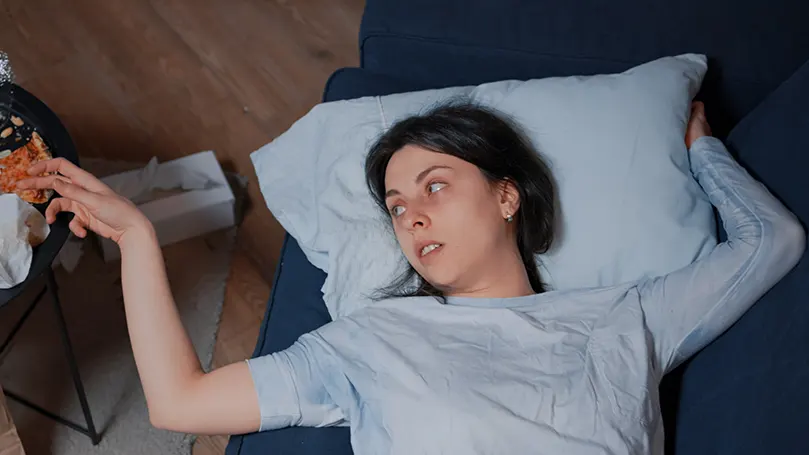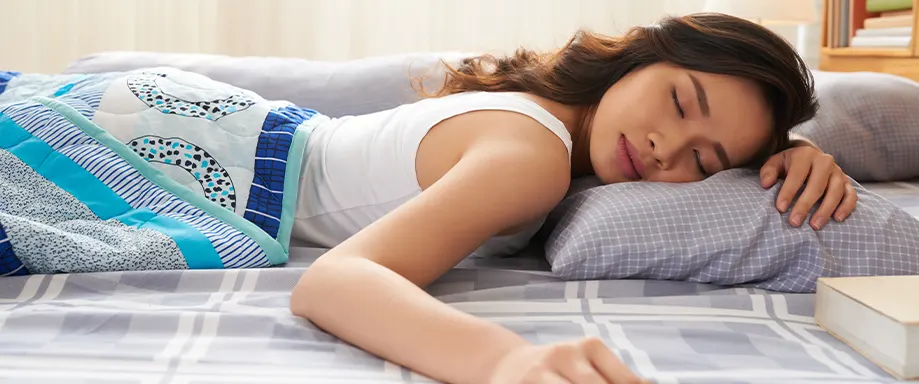What is sleep deprivation?

To understand the effects of sleep deprivation, we have to first know what sleep deprivation is! We were all sleep deprived at one point in our lives. We were sleep-deprived after pulling all-nighters so that we could finish that presentation for our work tomorrow. After hugging our books and Red Bulls all night so that we could pass our exams tomorrow.
We were sleep deprived after partying, taking care of our babies, worrying about something, etc. In other words, we were sleep deprived when we did not get enough sleep during the night and felt like zombies during the day. Having a lack of sleep just one night can't do much damage.
Yes, when you get less sleep than necessary during that one night, you will feel drowsy the next day, your thinking will be slow, your energy will be low, and you will be in an overall bad mood. But as soon as you get your seven to nine hours of sleep, all of these will go away.
However, if you continue to have insufficient sleep every night, your body and mind will suffer. For instance, sleep disturbances can lead to an increased risk of the following things:
- cardiovascular disease (such as high blood pressure, tachycardia, etc.)
- diabetes (type 1 and 2)
- weight gain which can turn into obesity
- hormone imbalance (especially with the stress hormone cortisol)
- weakened immune system
- back, neck, and joint pain
- anxiety and depression
- insomnia (even chronic insomnia)
- sleep and circadian disturbance
To avoid all of these, it is simple – don't be at a sleep loss! Sleep plays an important role in our lives for a reason. Thus, never sacrifice it so that you can work for a few extra hours.
Different types of sleep deprivation
According to sleep specialists, sleep deprivation (also called sleep insufficiency) can be categorised in two different ways:
- Acute sleep deprivation – happens when a person has sleep deficiency for several nights. In most cases, this type of sleep deprivation and all its symptoms disappear as soon as that person gets back to his/her normal sleep schedule.
- Chronic sleep deprivation or insufficient sleep syndrome – happens when a person has sleep deficiency for several months. With this type of deprivation, a person must see a sleep specialist and probably start using some sleep medicine.
How does sleep deprivation impact your day?

If you're a career-driven person, you might be tempted to stay up late and champion the saying “I'll sleep when I'm dead”. However, this way of thinking can be incredibly detrimental in the long run!
For one, if you try to lessen your sleep duration and if you sacrifice your quality sleep for the sake of productivity, well, your sleep deprivation will ‘kill' your progress. Why? Because you will not be able to hustle and get everything done because your poor sleep from last night will result in a lack of concentration, blurred eyesight, headache, irritability, and who knows what else.
These are the effects of sleep deprivation, and you will certainly feel them even from the first time you don't get a good night's sleep. And, if you continue to ‘work' on your chronic sleep deprivation, well, you will first develop all sorts of sleep disorders and then move on to developing some (or all) of the physical and mental health problems we mentioned above.
Thus, the next time you think about sacrificing your sleep to get that project done, think twice. Remember that poor sleep quality will result in poor work quality the next day too!
Possible solutions to alleviate the effects of sleep deprivation
If you don't want to be one of those people with sleep problems or insomnia symptoms in the middle of your work week, you have to work on your sleep quality. That means learning how to fall asleep easily and quickly, staying asleep all night long, and waking up feeling refreshed. For many sleep-deprived people, this seems like a mission impossible. But, trust us, it is not. You just have to work on your bedtime routine a bit more. A good quality bedtime routine will not only fix all of your sleep problems but also your quality of life (as we all know how beautiful (and productive) life can be when we are fully rested.
Thus, to say goodbye to poor sleep quality and say hello to a night of healthy sleep, here are some possible solutions.
Go to bed earlier
One of the best things you can do to help fight off your sleep deprivation (and probably all other sleep disorders) is to try to go to bed earlier every night. And, when we say early, we don't mean while the sun is still shining, no. But, around 10 o'clock would be perfect. Then, you are bound to have longer sleep, and, with longer sleep, you will probably also have more quality sleep.
Moreover, if you have difficulty falling asleep, try to go to bed every night at the same time, and preferably, try to get out of bed at the same time. When you don't have a consistent sleeping schedule, you disrupt your circadian rhythm – a thing that helps us fall asleep and wake up properly. Thus, even if you don't want to, try to force yourself to stick to your schedule. It might be difficult at first, but, after a while, your body and mind will get used to it, your circadian rhythm will balance back, and you can say goodbye to poor-quality sleep during the workweek.
Don't eat before bed
If you eat too many carbs before bed, well, you won't be in for the treat. You will have difficulties falling asleep, you will be tossing and turning during the night, and you will wake up tired and wired. This is because excessive carbs before sleep mess up our blood glucose and as a result, we can't get enough sleep.
However, if you really must eat something before bed, let that be something light – a veggie salad, a protein-packed meal, a bowl of fruit, etc. These ‘light' things the body processes more easily, and thus, we are able to fall asleep more easily.
Limit your caffeine intake
Well, this one is as straightforward as it can be. Caffeine keeps us wide awake. Thus, if you want to prevent sleep loss, just avoid coffee. Of course, we are not monsters, and we are not telling you to quit your coffee if you want to have a good night's sleep, no. But, what we are telling you is to not drink it after lunch – as simple as that.
Put all of your blue lights somewhere out of sight
Out of sight, out of mind! This quote should apply to all of your devices – TVs, computers, mobile phones, etc. These devices emit a lot of blue light – light that tires our eyes, but, at the same time, it makes us addicted. So, if possible, take everything out of your bedroom when it's time for sleep. If not, at least turn it off.
After a couple of nights sleeping in pitch dark and with no distractions, be sure that you will fight off your sleep disorder, whatever disorder that may be. And, of course, by doing this, you will also fight off that mid-week crash and finally be able to get the work done properly.
Stretch a bit

Chronic sleep loss can also come from too much energy in your body. This sounds strange, we know. But, give us a chance to explain. Namely, even though you are working all the time, you are probably sedentary. That is, you are sitting on your chair, hunched over your table.
Even though this burns your ‘mental' energy, it doesn't burn your ‘physical' energy. And, when your body has a lot of the latter, you have trouble sleeping. You either can't fall asleep or if you do, you are not staying asleep for long.
One of the best ways to increase your body's ability to burn some of this physical energy is to do some exercise before bed, or at least, during the day when you have a break from work. Trust us, all sleep specialists will tell you the same! So, do your best to include some exercises in your day.
You don't have to do anything like HIIT or weight lifting, you don't even have to go running or play a sport, you can do something light and fast, like yoga, stretching, dancing, or whatever you find easy and comfortable. Doing this will ensure a night of uninterrupted sleep, it will not put you at an increased risk of getting those previously mentioned diseases and sleep disorders, and it will, of course, boost your immune system.
Have a nice sleep environment
To have a night of adequate sleep, you should also work on the looks and feels of your bedroom. It is simple – if the room you are using for sleep is cluttered, messy, and dirty, both your sleep and your mental health will suffer. So, declutter and clean that room and say goodbye to your chronic sleep loss.
Moreover, besides being clutter-free and clean, your sleep environment should also be dark. According to sleep specialists, a room with no light and with no disturbances (such as blue lights, various noises, etc.) can significantly contribute to having a night of sufficient sleep. So, you can try to invest in some nice window shades and curtains, get all your blue lights out, and try to limit the outside noise as much as you can.
Invest in good sleeping products
Of course, to improve your sleep efficiency and prolong your hours of sleep (good-quality sleep), you simply must invest in good sleeping products. And, by sleeping products, we mean a mattress, pillow, and bedding – pretty much, you have to invest in making your bed even comfier.
However, don't just go outside and buy the first sleeping products you find. No, you have to fund the products that work for you, your body, your mind, and your sleep. So, first, look for a mattress that suits your needs. For instance, if you sleep on your stomach or on your side, you will need a softer mattress, one made of memory foam. And, if you are sleeping on your back (or if you have back or neck pain), you will need a firmer mattress, one with coils. The same applies to your pillow and your bedding – thus, do your research and find the best thing for yourself. Once you do this, trust us, your sleep schedule and sleep patterns will get back on track and you will finally have that good night's sleep.
Conclusion
Don't overwork yourself unless you absolutely have to. Always put your sleep and your health first, and you will save yourself not only from excessive daytime sleepiness and chronic sleep deficiency but also from mental health problems and physical health problems. And now that you know the effects of sleep deprivation, we hope that you will make getting proper rest a priority!
Spread the word
Recommended reading:















There are no comments yet
"*" indicates required fields